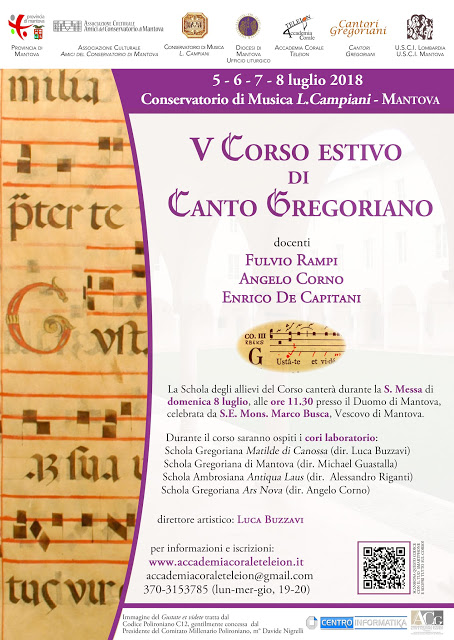
Mese: Giugno 2018
The London Oratory
The Church of the Immaculate Heart of Mary, better known as Brompton Oratory, is home to the Congregation of the Oratory of St Philip Neri in London, a community of priests living under the rule of life established by its founder in the sixteenth century. The Oratory also serves as a parish church in the Roman Catholic Diocese of Westminster.
Novus Ordo Latin Masses:
Sunday 11.00am (Solemn)
Monday to Friday 6.00pm
Holy days of obligation: 6.30pm (Solemn) (on the eve: 6.30pm (First Mass of the Feast))
(Source)
Le chant grégorien en Afrique
L’Afrique en général et le Cameroun en particulier ont bien intégré le chant grégorien dans leur culture.
(…)
Auprès des païens, la beauté du culte, des chants, des cérémonies, étaient souvent la première occasion de l’appel à la foi.
Article complet ici.
La musica e il canto sacro secondo il Concilio Vaticano II
Ten advantages / Dieci vantaggi
Ten Advantages
What are the advantages of standing at the altar ad orientem? I can think of ten straight off:
1. The Holy Sacrifice of the Mass is experienced as having a theocentric direction and focus.
2. The faithful are spared the tiresome clerocentrism that has so overtaken the celebration of Holy Mass in the past forty years.
3. It has once again become evident that the Canon of the Mass (Prex Eucharistica) is addressed to the Father, by the priest, in the name of all.
4. The sacrificial character of the Mass is wonderfully expressed and affirmed.
5. Almost imperceptibly one discovers the rightness of praying silently at certain moments, of reciting certain parts of the Mass softly, and of cantillating others.
6. It affords the priest celebrant the boon of a holy modesty.
7. I find myself more and more identified with Christ, Eternal High Priest and Hostia perpetua, in the liturgy of the heavenly sanctuary, beyond the veil, before the Face of the Father.
8. During the Canon of the Mass I am graced with a profound recollection.
9. The people have become more reverent in their demeanour.
10. The entire celebration of Holy Mass has gained in reverence, attention, and devotion.
Dieci vantaggi
Quali sono i vantaggi di stare all’altare rivolto ad orientem? Me ne vengono subito in mente dieci:
1. Si fa esperienza della direzione e della focalizzazione teocentrica del Santo Sacrificio della Messa.
2. I fedeli vengono risparmiati dal noioso clerocentrismo che ha invaso la celebrazione della Santa Messa negli ultimi quarant’anni.
3. È di nuovo evidente che il Canone della Messa (Prex Eucharistica) è indirizzato al Padre, dal sacerdote, in nome di tutti.
4. È meravigliosamente espresso e affermato il carattere sacrificale della Messa.
5. Quasi impercettibilmente si scopre la convenienza di pregare in silenzio in certi momenti, di recitare a bassa voce alcune parti della Messa e di cantillare gli altri.
6. Offre al sacerdote celebrante il dono di una santa modestia.
7. Mi ritrovo sempre più identificato con Cristo, Eterno Sommo Sacerdote e Hostia perpetua, nella liturgia del santuario celeste, oltre il velo, davanti al Volto del Padre.
8. Durante il Canone della Messa mi viene donato un profondo raccoglimento.
9. I fedeli sono diventati più riverenti nel loro comportamento.
10. L’intera celebrazione della Santa Messa ha guadagnato in riverenza, attenzione e devozione.
Dominica XI “per annum”
Ant. ad introitum Cf. Ps 26, 7.9
Exáudi, Dómine, vocem meam, qua clamávi ad te.
Adiútor meus esto, ne derelínquas me,
neque despícias me, Deus salutáris meus.
Collecta
Deus, in te sperántium fortitúdo,
invocatiónibus nostris adésto propítius,
et, quia sine te nihil potest mortális infírmitas,
grátiæ tuæ præsta semper auxílium,
ut, in exsequéndis mandátis tuis,
et voluntáte tibi et actióne placeámus.
Per Dóminum.
Super oblata
Deus, qui humáni géneris utrámque substántiam
præséntium múnerum
et aliménto végetas et rénovas sacraménto,
tríbue, quǽsumus, ut eórum
et corpóribus nostris subsídium non desit et méntibus.
Per Christum.
Ant. ad communionem Ps 26, 4
Unum pétii a Dómino, hoc requíram,
ut inhábitem in domo Dómini
ómnibus diébus vitæ meæ.
Vel: Io 17, 11
Pater sancte, serva eos in nómine tuo,
quos dedísti mihi, ut sint unum sicut et nos, dicit Dóminus.
Post communionem
Hæc tua, Dómine, sumpta sacra commúnio,
sicut fidélium in te uniónem præsígnat,
sic in Ecclésia tua unitátis operétur efféctum.
Per Christum.
© Copyright – Libreria Editrice Vaticana
Messalino in PDF con letture in lingua italiana (da stampare su fogli A3 fronte/retro)
Corsi estivi di Canto Gregoriano – Bergamo

Modulo di iscrizione qui.
Video dell’omelia del card. Sarah a Chartres
Das Stundengebet in lateinischer Sprache
Man dürfte also während einer Feier in der Muttersprache fast jedes beliebige lateinische Element einfügen, insbesondere, wenn es sich um einen Gesang handelt. So gibt es zum Beispiel für alle Hymnen und die meisten Antiphonen eine eigene lateinische Fassung, die man verwenden kann. Die lateinische Sprache darf man auch für die Hymnen aus dem Evangelium und für das Te Deum verwenden.



